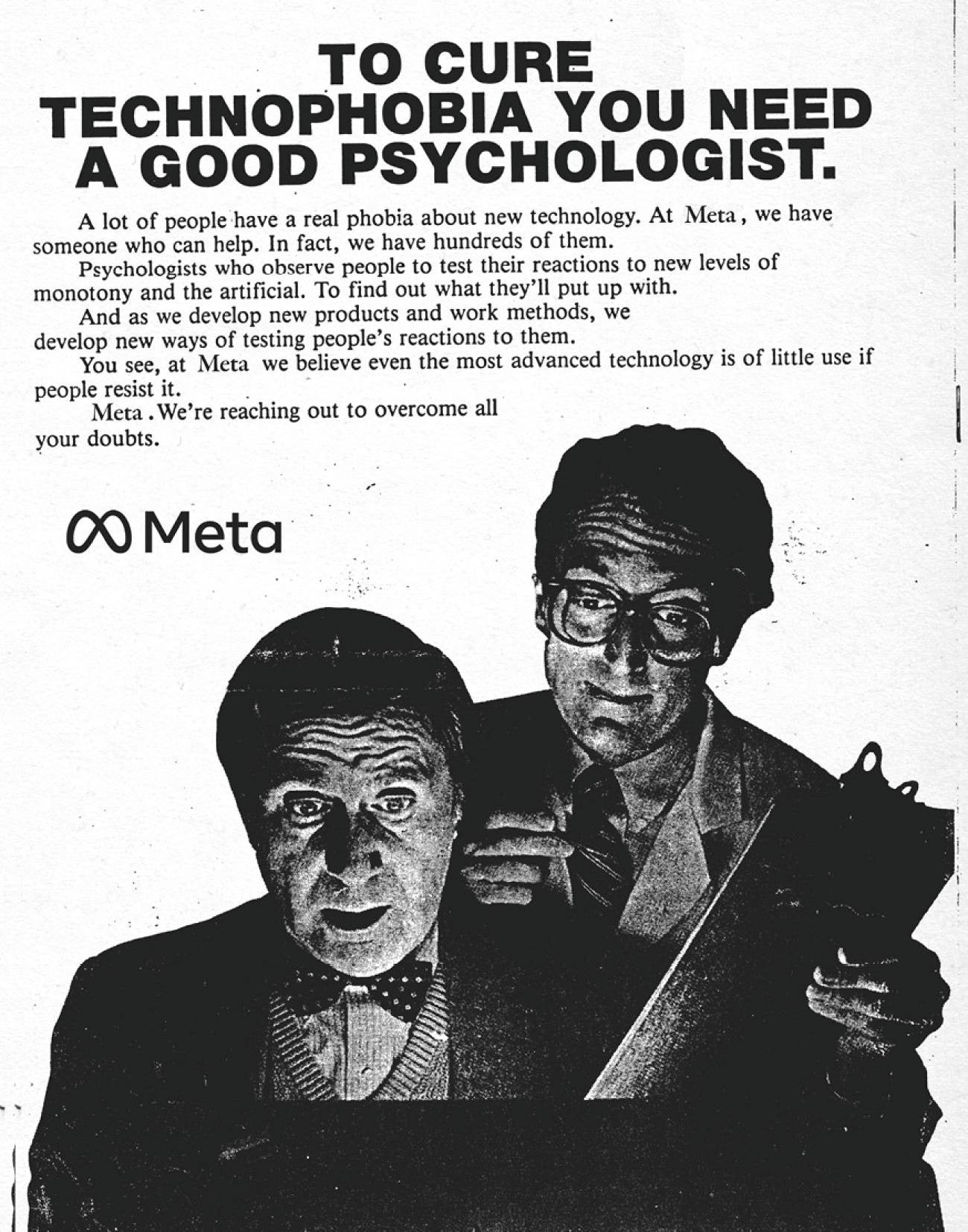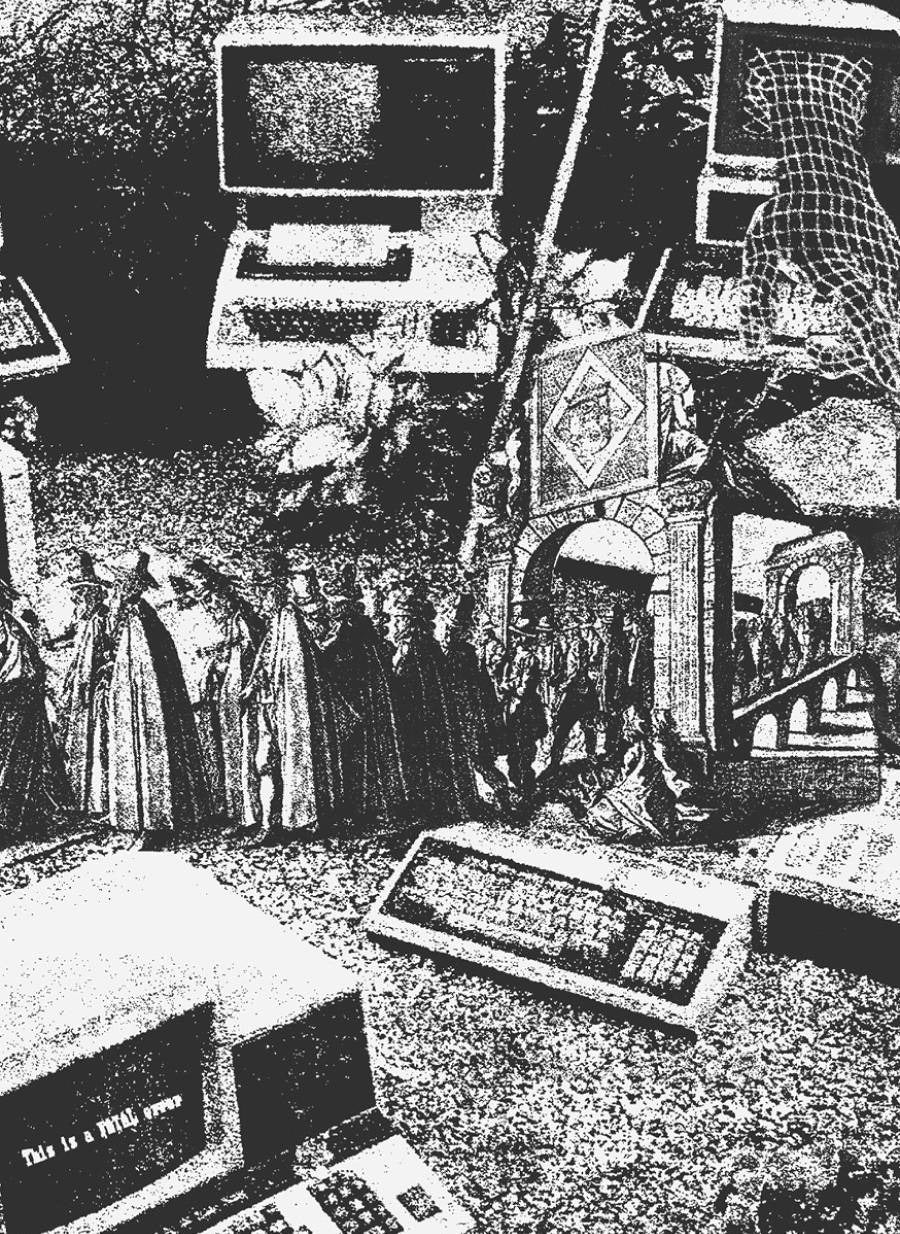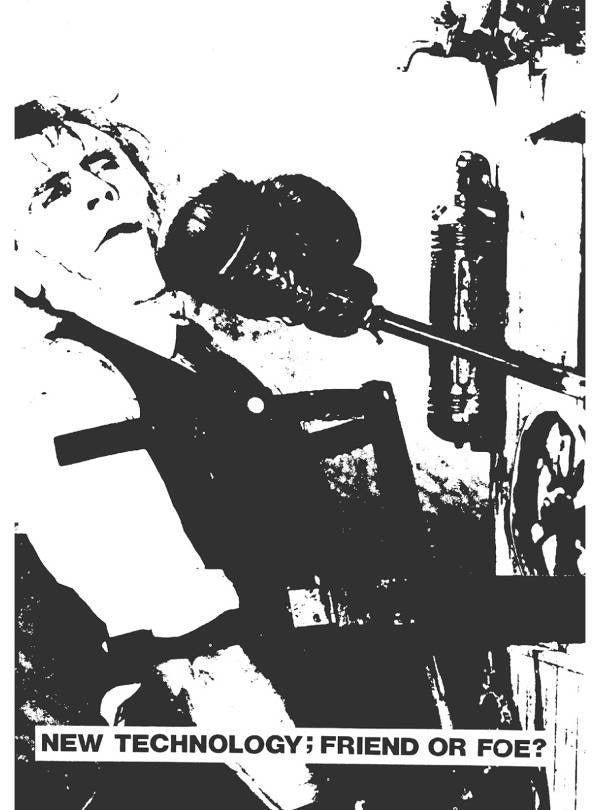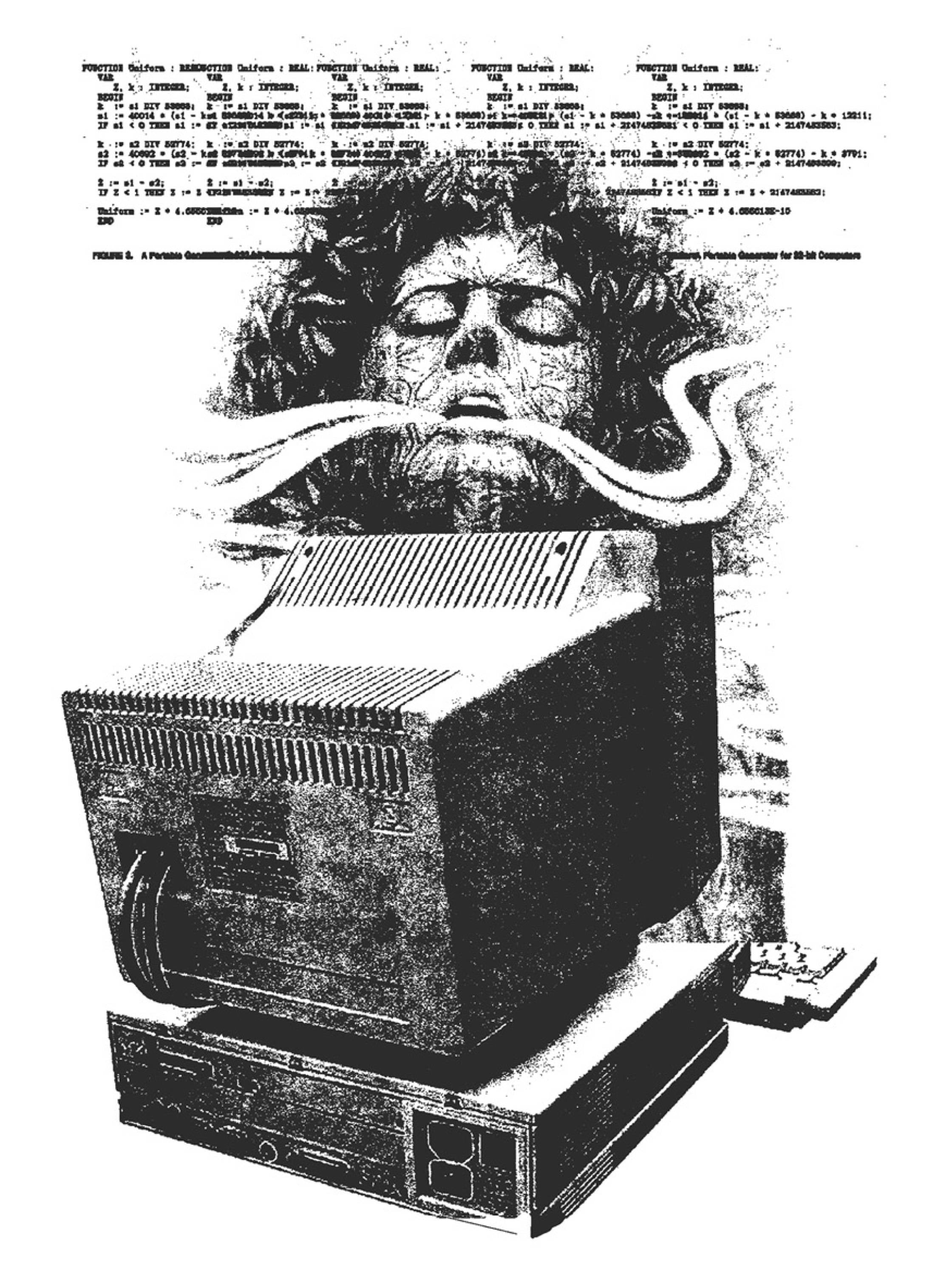
Launched at the end of 2021, Hollow Earth Transmission is an archive of printed matter and ephemera, with a particular focus on pre-internet culture. Existing primarily — and perhaps ironically — as an instagram account, HET seeks to document the power of print in shaping our collective consciousness, spanning topics from 1960s left wing dissidents in the UK through to banned Japanese literary magazines. Central to each post is the idea that print is an inherently subversive medium, capable of evading censors and operating below-the-radar of power and authority.
This spirit, which has defined many of the archived print projects found on HET, also evokes that of the early internet — a loosely defined space, where people would seek out communities that reflected their niche obsessions and latent identities. It was a space that was unrecognizable, compared to how we know and interact with the internet today; its radical potential long since dulled by a deluge of adverts and dopamine-inducing notifications.
For our most recent issue of WIP magazine, we asked the visual artist behind HET, Niall Greaves, to create a publication that pays tribute to pre-internet print projects, accompanied by an essay from the writer and artist Brad Phillips, which reminisces about the oddities and eccentricities of Internet 1.0.

Internet Before Christ
Words by Brad Phillips
Artworks by Niall Greaves
Tony Soprano once described “remember when” as the lowest form of conversation, and I’ve previously claimed in print that “nothing is as painful as nostalgia.” But in talking about the early internet, “remembering when” and engaging in nostalgia are both inescapable, so if this essay betrays my own beliefs and proves Tony Soprano’s point, blame the internet, not me.
I went online in 1990.
I was sixteen years old.
My first modem was a gift from my second cousin Ronald, an outlier in my WASP, Scotch-Irish family who makes a neat analogy between the internet of 1991 and the internet of today.
Ronald was a nudist, and there were whispers that he and his wife were swingers. Nudists and swingers both exist as taboo sects inside normal society, seeking to maximize their pleasure and personal freedom from within the confines of an oppressive moral structure. The early internet was a boon to people like Ronald, allowing him to communicate with other like-minded libertines around the world. The internet then, like swinging, was mysterious and specialized. There were secret codes, rules and etiquette. And just like on some swinger weekend held at a Holiday Inn outside of Cleveland, there was first and foremost anonymity.
The first people who will grapple with new inventions tend to be those who need them most. To decode and use the early iteration of anything you will have felt the gap for it. The internet of 1991 consisted primarily of bulletin boards, digital versions of the back pages of newspapers and magazines. Beyond tech geeks, anyone with interests which were specific—like my cousin Ronald—would immediately seize on both the anonymity and functionality offered by these websites.
In the early nineties, the internet was something you had to seek out, often with difficulty. If you were online, you were likely one of only a handful of people in your school or neighborhood who was. You might pass someone on the way to history class who also had a modem, and neither of you would know you shared this secret life. They might be spending their nights on bulletin boards devoted to Dungeons & Dragons while you spent yours on bulletin boards devoted to Star Trek, recipes or NASCAR.
In 2023 everyone is online, is required to be online, and what I and many others now seek is a way to get offline, something that feels much more difficult than its alternative was in the 90s.
All good things must come to an end, and when they come to an end in our era, it’s usually because of corporate greed and an increasing clampdown on personal liberty. What did I do online so long ago, what did I enjoy? If the freedom represented by the early internet is dead, then let me deliver the eulogy.

1.
I did pass people in the hallways of my high school who were also online without knowing it. In 1991 I joined a bulletin board system that operated as a Pyroto Mountain. Wikipedia describes a Pyroto Mountain as “an online game based on answering trivia and skill-testing questions.” I can barely remember what was involved, but do remember it took almost a minute for my modem to connect, during which time my bedroom sounded like two chimpanzees fighting to the death. There were rudimentary graphics, vague goals and no advertising. It wasn’t possible to chat in real time with other players, but we could post on message boards then return to look at responses. One person who was active on the site went by the handle Milky Puppy (hereafter MP). Eventually I came to realize I went to school with this person. MP made references to a zine called Yip that I’d seen passed around during lunch. I began leaving messages on the Pyroto Mountain for MP and he’d respond. He eventually became my first internet friend. One day towards the end of the 12th grade I was in the library and saw someone using the photocopier to make copies of Yip. It was MP, and it was awkward. Online we were both confident and sarcastic. In person we were both quiet, insecure and geeky. I can’t share his name, but our friendship grew to such an extent that in 2001, when he got the call from the hospital that a liver had become available for transplant and he should get in a cab, I was eating dinner with his girlfriend and my then wife.
MP and I didn’t start hanging out together at school once we knew who each other were. Instead he shared other websites with me, other BBS’s, and through him I met more people, many of whom lived in my small town. During my early twenties once a week we’d all meet at a local pub for trivia night. A half dozen people I’d been interacting with online all drinking beer and going full geek with arcane facts. During those years MP started his own website called Infiltration.org. He was one of the pioneers of what’s now called Urbex, urban exploration, the act of breaking into restricted public spaces with the sole purpose of exploring and photographing, and leaving no trace behind. His site still exists today—along with a book—and he’s a legend in the community. Like cousin Ronald, the internet was an ideal place for people in MP’s world—necessarily anonymous due to the numerous laws they broke in pursuit of their hobby—to post photographs and share information. If it weren’t for that original Pyroto Mountain I’d never have known about Urbex, come to respect it, and become friends with MP. An entire subculture spawned in large part by a geek from suburban Toronto, disinterested in fame or profit, an attitude which feels antithetical to most online pursuits in 2023.

2.
One of the websites, another bulletin board that MP told me about, was called Powderkeg.
Like most geeks tending toward melancholy, I sometimes wrote poetry. Powderkeg was strictly a poetry board. Again, no chat, no ads and no money. My poetry was abysmal but one day in 1993 someone left an encouraging comment beneath a poem that I’d posted. He sent me a private message. Ian was an English Lit major at the University of Toronto, which is where I wanted to go. We exchanged emails. Feeling very brave one day, I met him for coffee in the city. (I grew up without a father or any brothers and have always been a sucker for paternal attention.) Lollapalooza 2 was outside of Toronto that year. I didn’t have a car or a license but I had a girlfriend who wanted to go. The night before the festival Harmony and I took the train to Toronto and stayed with Ian and his girlfriend. This was exotic to me, almost dangerous. Ian and his girlfriend smoked hash with us, and although they were only just in their twenties they seemed more like fifty. I instantly felt like an adult. In the morning we woke up early, piled into his Volkswagen and drove two hours to the venue. I saw Ministry, Cypress Hill and The Jesus and Mary Chain before succumbing to heatstroke. Ian and Harmony found me hours later laying with my head underneath the Volkswagen. We drove back to Toronto, and over the next few years I occasionally met him and other fledgling poets for coffee.

3.
From 1993 to 2013 my relationship to the internet revolved almost exclusively around a website called ISC.RO. The Internet Scrabble Club.
Growing up I played Scrabble with my grandmother, who early on instilled in me a love of words and books. At a certain point I became better than my grandmother and began to throw games – she was an extremely sore loser.
Hosted in Romania, ISC is the only Scrabble website immune to litigation from Parker Brothers, the original Scrabble manufacturer. As someone who enjoyed both solitude and marijuana, online Scrabble offered me a way to focus my energy and avoid life at the same time. I became well known on the site, both for my unrelenting trash talk and my ability to beat most players in three minute games. There were times during that period where I played upwards of a hundred games a day. I haven’t played there for many years but just logged on to view my stats.
WINS: 34616
LOSSES: 19951
DRAWS: 470
This level of Scrabble is akin to swinging and nudity. It’s full of secret language, specific etiquette, and, as has been my experience with swinging and nudism, it is populated primarily by geeks. ISC harkens back to the early internet too: the graphics are shitty because they don’t need to be otherwise. There is no advertising and nothing to buy. I played with people named NoChance4U, a dentist in Gainesville Florida; ikantspell, a single mother in Belfast; and giJoel, GI Joel Sherman—GI because of his gastrointestinal problems and constant consumption of Maalox—star of the Scrabble documentary Word Wars, 1997 World Scrabble Champion and director of the North American Scrabble Players Association Club #56 in New York City, where I’ll be playing next Thursday.
Often during my twenty year stretch on ISC, I woke up and went to bed anagramming words in my mind, and not by choice. I played so much that I altered the structure of my brain, which became a machine that rearranged letters in pursuit of maximum points. Twenty years ago if someone told me I’d play Scrabble in the same room as Joel Sherman, the most famous Scrabble player to ever live, I’d have called bullshit. But, next Thursday my wife Cristine and I are going to our first session at the New York clubhouse. This, a connection to something specific based around community, is what the internet was about in 1990, and arguably is what those who created the internet intended. Fifteen years ago I watched Word Wars in a house in Vancouver, watched Joel Sherman sweat and pop Tums and lay down two hundred-plus point words. Thursday I’ll see it in person. This is the result of time spent seeking without an agenda, learning through exploration what interested me, then developing it. I didn’t need algorithms or targeted ads to get to this place, I needed freedom from those things, and permission to be curious. It’s important at my age, forty-nine, to not sound like an old-fogey, be judgemental or engage in nostalgia, but I feel genuine concern for the generations that are yet to come, who will be directed towards what the market predicts they’ll enjoy, always in pursuit of their money, and attention. I’m happy I got online at the age that I did. In 1991 I was the one with my hands on the steering wheel, taking this fucked up invention where I wanted it to go, discovering new areas of culture and my own mind. Today the internet is pitched as a vehicle of personal freedom, but it's a self-driving car that knows exactly where it’s about to take you, whether you like it or not. And if you don't like it, you’ll learn to. In large part because you’ve been steered away from other parts of the territory.
![]()
